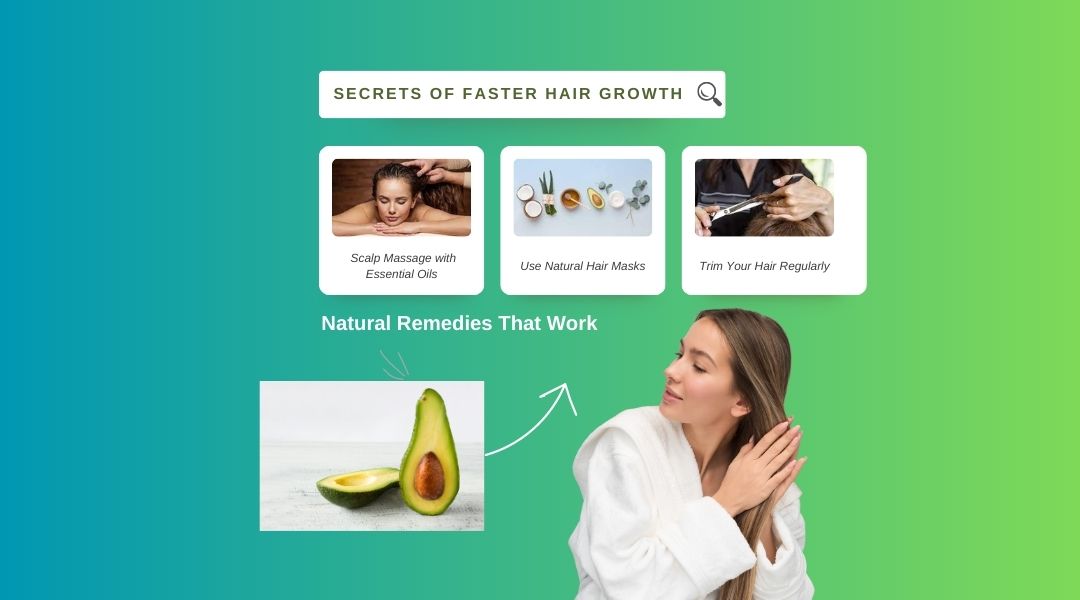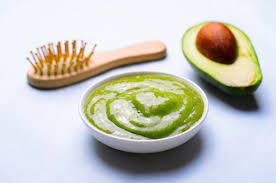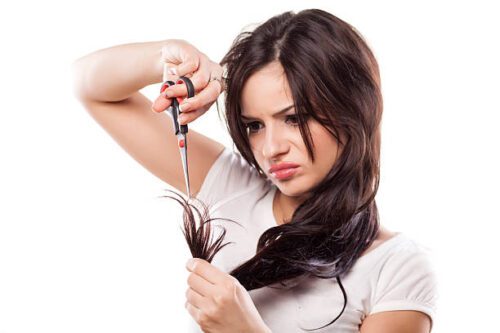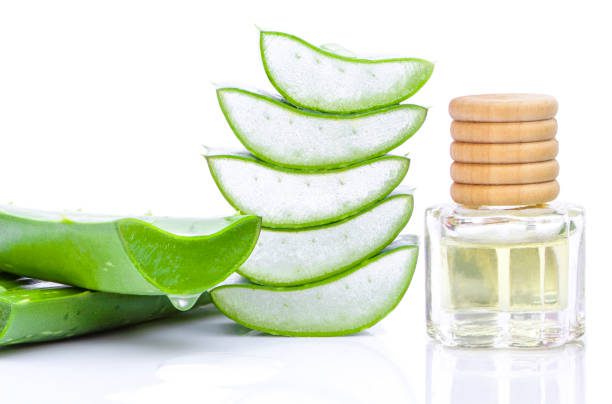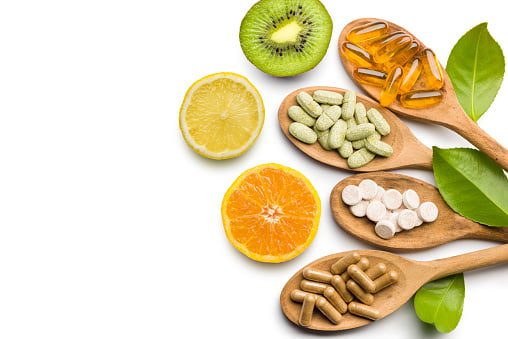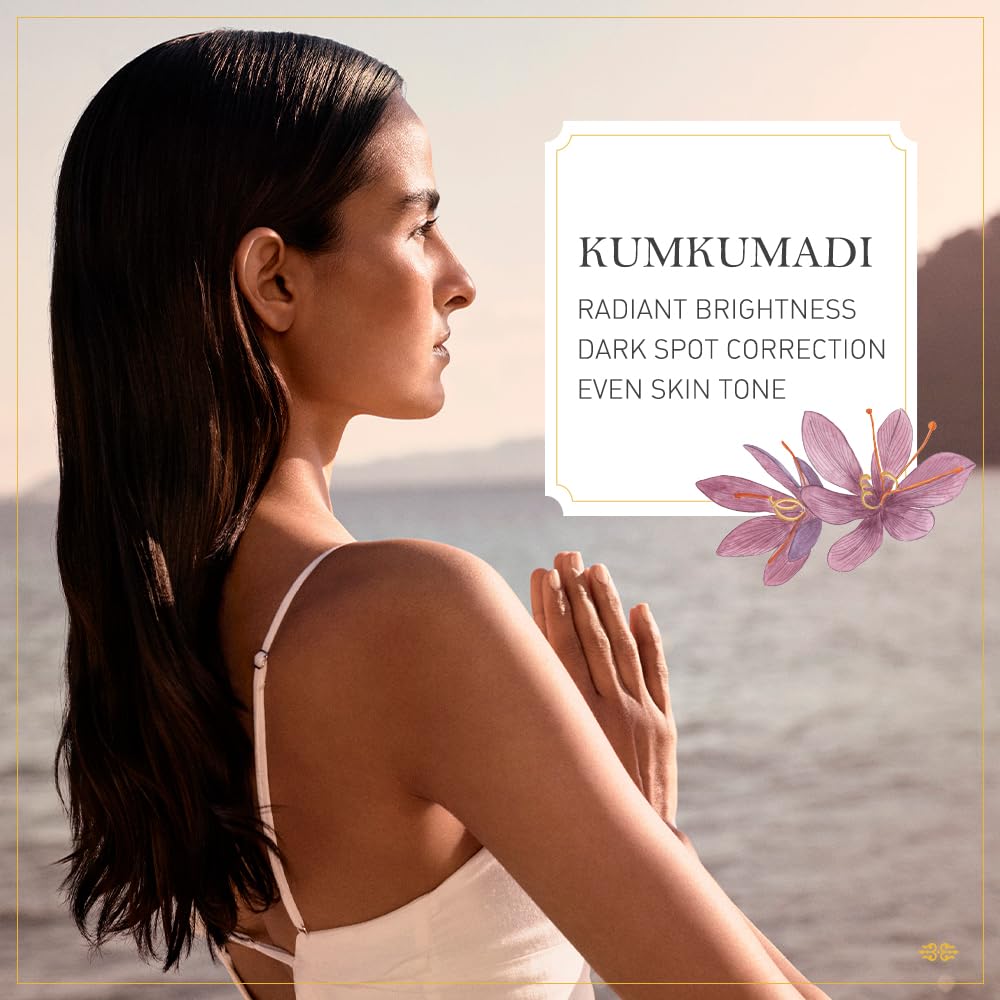Secrets of Faster Hair Growth Are you tired of waiting endlessly for your hair to grow? Does it feel like an eternity between haircuts? Many of us yearn for long, luscious locks, but the slow pace of hair growth can be frustrating. Fear not, for there are natural remedies that can help accelerate this process. In this article, we will unlock the secrets of faster hair growth, offering you insights into effective and natural solutions to promote the healthy growth of your precious mane.
Understanding the Basics of Hair Growth
Before we delve into the natural remedies, let’s briefly understand the science behind hair growth. Hair growth occurs in cycles and consists of three main phases:
- Anagen Phase: This is the active growth phase, where hair follicles produce new hair. It can last anywhere from 2 to 7 years.
- Catagen Phase: This is a transitional phase where hair growth slows down, lasting for about 10 days.
- Telogen Phase: In this phase, hair rests and eventually falls out, making room for new hair to grow. It can last for 3 to 4 months.
Now that we’ve covered the basics, let’s explore some natural remedies that can help speed up your hair’s journey through these phases.
1. Nourish Your Body with a Balanced Diet
In a world filled with fad diets and conflicting nutrition advice, it’s easy to get lost in the noise. But one timeless truth remains: nourishing your body with a balanced diet is the key to a healthier and happier life. In this blog post, we will delve into the importance of a balanced diet, and provide you with valuable insights.
The Power of a Balanced Diet
A balanced diet includes a variety of foods from all food groups, in the right proportions. Here are some reasons why it’s crucial:
Nutrient Intake: A balanced diet ensures that you get all the essential nutrients your body needs to function correctly. This includes vitamins, minerals, carbohydrates, proteins, and healthy fats.
Weight Management: It can help you maintain a healthy weight or reach your weight goals. Balancing calorie intake with physical activity is key to weight management.
Disease Prevention: Eating a variety of foods can lower the risk of chronic diseases like heart disease, diabetes, and certain cancers.
Energy Boost: The right combination of nutrients keeps your energy levels stable throughout the day, preventing energy crashes.
Mood and Mental Health: Proper nutrition can positively impact your mood and mental well-being.
Tips for a Balanced Diet
Now that you understand why a balanced diet is essential, here are some practical tips to help you achieve it:
Fill Half Your Plate with Veggies and Fruits: These are rich in vitamins, minerals, and fibre.
Choose Whole Grains: Opt for whole grains like brown rice, quinoa, and whole wheat bread instead of refined grains.
Include Lean Proteins: Incorporate lean sources of protein like poultry, fish, beans, and tofu into your meals.
Healthy Fats: Use olive oil, avocados, and nuts for healthy fats instead of saturated and trans fats.
Limit Added Sugars: Be mindful of sugary snacks and drinks. They can lead to weight gain and other health issues.
2. Scalp Massage with Essential Oils
In our fast-paced world, where stress and tension often take centre stage, it’s essential to find moments of serenity and self-care. One such delightful escape is indulging in a scalp massage with the added therapeutic benefits of essential oils. In this post, we’ll explore the art of scalp massage, the best essential oils for it, and how this simple ritual can nourish not only your scalp but also your soul.
The Magic of Scalp Massage
- A scalp massage is more than just a feel-good practice; it’s a holistic approach to health and well-being. Here are some compelling reasons to incorporate it into your self-care routine:
- Stress Reduction: Scalp massage stimulates the release of feel-good hormones like serotonin and reduces the stress hormone cortisol, promoting relaxation and tranquillity.
- Improved Circulation: The gentle kneading and rubbing motion increase blood flow to the scalp, delivering more nutrients to the hair follicles and promoting hair growth.
- Enhanced Sleep: A scalp massage before bedtime can improve sleep quality by calming the mind and relaxing the body.
- Healthy Scalp: Regular massages can help remove dry, flaky skin and dandruff, ensuring a healthier scalp.
- Hair Health: Massaging with essential oils can strengthen hair roots, reduce breakage, and add a natural shine to your locks.
The Best Essential Oils for Scalp Massage
- Choosing the right essential oils can elevate your scalp massage experience. Here are some of the best options:
- Lavender Oil: Known for its calming properties, lavender oil soothes the scalp and reduces stress.
- Peppermint Oil: Invigorating and refreshing, peppermint oil can boost circulation and provide a tingling sensation.
- Tea Tree Oil: Excellent for those with dandruff or an itchy scalp, tea tree oil has antifungal properties.
- Rosemary Oil: This oil is believed to promote hair growth and improve thickness.
- Jojoba Oil: A carrier oil, jojoba oil, can be used as a base for essential oils. It’s deeply moisturizing and suitable for all hair types.
How to Perform a Scalp Massage with Essential Oils
- Choose Your Oils: Mix a few drops of your chosen essential oil with a carrier oil like jojoba or coconut oil. This dilution ensures safe and effective application.
- Prepare: Find a quiet, comfortable space. Use a towel to protect your clothing.
- Apply the Oil: Start by applying a small amount of the oil mixture to your fingertips.
- Massage: Using gentle circular motions, begin massaging your scalp. Start at the forehead and work your way to the nape of your neck.
- Focus on Pressure Points: Pay special attention to pressure points around your temples and the base of your skull. These areas hold a lot of tension.
- Relax: Take your time, and focus on deep breaths. Let the soothing scents and sensations wash over you.
- Leave it On You can leave the oil on your scalp for at least 20 minutes or even overnight for maximum benefits.
- Wash and Enjoy: Shampoo and condition your hair as usual, and relish the revitalized feeling.
- A scalp massage with essential oils is a beautiful blend of self-care and wellness. It’s a moment to slow down, de-stress, and pamper yourself.
- Incorporate this simple ritual into your routine, and you’ll not only enjoy a healthier scalp and hair but also find solace in the soothing touch and scents that envelop you during the process. Embrace the magic of scalp massage with essential oils, and let it nourish both your scalp and your soul.
3. Use Natural Hair Masks
In the quest for healthy, beautiful hair, sometimes the best solutions are the simplest ones. Natural hair masks, made from everyday kitchen ingredients and botanical wonders, hold the key to unlocking the radiant locks you’ve always dreamed of.
In this post, we’ll delve into the world of natural hair masks, exploring their benefits, some easy DIY recipes, and tips for achieving gorgeous, luscious hair.
The Magic of Natural Hair Masks
- Natural hair masks are a revelation for your tresses. They offer numerous benefits that commercial products often can’t match:
- Deep Conditioning: Hair masks provide deep hydration, helping to repair and nourish damaged hair strands.
- Improved Hair Texture: They can make your hair softer, smoother, and more manageable, reducing frizz and dryness.
- Enhanced Shine: Natural ingredients can add a beautiful shine to your locks, making them look healthy and lustrous.
- Strengthening: Certain masks can strengthen hair, reducing breakage and promoting growth.
- Scalp Health: Some masks address scalp issues, like dandruff or an itchy scalp, promoting overall hair health.
DIY Natural Hair Mask Recipes
Creating your natural hair masks is simple and cost-effective. Here are three DIY recipes to get you started:
1. Avocado and Honey Mask
Ingredients:
- 1 ripe avocado
- 2 tablespoons of honey
- 1 tablespoon of olive oil
Directions: Mash the avocado and mix it with honey and olive oil until you have a smooth paste. Apply to damp hair, leave it on for 20-30 minutes, and rinse thoroughly.
2. Coconut Milk and Banana Mask
Ingredients:
- 1 ripe banana
- 1/4 cup of coconut milk
- 1 tablespoon of honey
Directions: Blend the banana, coconut milk, and honey until you have a creamy mixture. Apply to hair, cover with a shower cap, and leave on for 30 minutes before rinsing.
3. Yogurt and Egg Mask
Ingredients:
- 1/2 cup of plain yogurt
- 1 egg
Directions: Beat the egg and mix it with the yoghurt until well combined. Apply to hair, leave it on for 20 minutes, and rinse with cool water.
Tips for Using Natural Hair Masks
- Start with Clean Hair: Shampoo your hair before applying a mask for better absorption of nutrients.
- Even Distribution: Use a wide-toothed comb to ensure even distribution of the mask.
- Time It Right: Follow the recommended leave-on time for each mask to maximize its benefits.
- Rinse with Cold Water: Cold water helps to seal the hair cuticle, locking in the mask’s goodness.
- Consistency is Key: To see significant improvements, use natural hair masks regularly, ideally once a week.
The journey to healthier, more beautiful hair can be as close as your kitchen. Natural hair masks offer a natural, effective, and affordable way to transform your locks. With these DIY recipes and tips, you can embark on a journey to luscious, radiant hair that’s sure to turn heads wherever you go. Say goodbye to hair woes and hello to the magic of natural hair masks!
4. Avoid Over styling and Heat Damage
Hair is often referred to as our “crowning glory,” and rightly so. But maintaining that glory requires more than just styling. It’s about protecting your hair from the perils of over-styling and heat damage. In this post, we’ll unveil the key reasons to steer clear of these hair-harming habits, share tips for healthier alternatives, and provide a comprehensive hair care routine to keep your mane looking its best.
The Perils of Over styling
- Overstyling refers to the excessive use of heat-styling tools, chemicals, or tight hairstyles. Here’s why it can be detrimental to your hair:
- Heat Damage: Excessive use of flat irons, curling irons, and blow dryers can lead to heat damage, making your hair dry, brittle, and prone to breakage.
- Chemical Stress: Frequent colouring, perming, or relaxing treatments can weaken the hair’s structure, leaving it fragile and more susceptible to damage.
- Traction Alopecia: Tight hairstyles like braids, weaves, and ponytails can cause hair loss due to constant pulling on the hair follicles.
- Split Ends: Over-styling can cause split ends, making your hair look unhealthy and unkempt.
Embrace Healthier Alternatives
- To maintain beautiful and healthy hair, consider these alternatives to over-styling:
- Air Dry Your Hair: Whenever possible, let your hair air dry instead of using heat. Patience pays off in the form of less damage.
- Use Heat Protectants: When you must use heat styling tools, apply a heat protectant to create a barrier between your hair and the heat source.
- Limit Chemical Treatments: Minimize the use of harsh chemical treatments and opt for gentler, more natural options.
- Loose Hairstyles: Choose looser hairstyles that don’t tug on your hair or scalp, reducing the risk of traction alopecia.
A Comprehensive Hair Care Routine
- Maintaining healthy hair isn’t just about avoiding damaging habits; it’s also about nurturing your locks with proper care. Here’s a simple yet effective routine:
1. Gentle Shampooing:
Use a sulfate-free shampoo to cleanse your hair without stripping it of natural oils. Shampoo 2-3 times a week or as needed.
2. Condition Regularly:Apply a conditioner to the lengths and ends of your hair to keep it moisturized and manageable.
3. Weekly Deep Conditioning:
Once a week, treat your hair with a deep conditioning mask to restore moisture and repair damage.
4. Avoid Hot Water:
Wash your hair with lukewarm or cool water to prevent stripping away essential oils.
5. Pat, Don’t Rub:
After washing, gently pat your hair with a towel instead of vigorously rubbing it to prevent breakage.
6. Minimal Heat Styling:
Limit heat styling to special occasions. When you use heat tools, keep them at lower temperatures and use a heat protectant.
7. Regular Trims:
Trim your hair every 6-8 weeks to get rid of split ends and promote healthy growth.
Your hair is a reflection of your overall health and well-being, and its care should be approached with mindfulness and care. By avoiding over-styling, embracing healthier alternatives, and following a well-rounded hair care routine, you can enjoy beautiful, resilient locks that shine with vitality. Remember, it’s not just about looking good; it’s about keeping your hair’s health intact for years to come. Say no to over-styling and heat damage, and say yes to lustrous, gorgeous hair!
5. Stay Hydrated
Water, the elixir of life, is one of the most vital elements for our well-being. In the hustle and bustle of our daily lives, it’s easy to overlook the simple act of staying hydrated. However, the impact of adequate hydration on our health is profound. In this blog post, we’ll dive into the incredible benefits of staying hydrated, along with practical tips to ensure you’re sipping your way to a healthier, happier you.
The Power of Hydration
- Water is the cornerstone of life, and our bodies depend on it in countless ways. Here’s why staying hydrated is so crucial:
- Improved Physical Performance: Dehydration can lead to fatigue and reduced endurance during physical activities. Staying hydrated helps you perform at your best.
- Clearer Skin: Proper hydration flushes toxins from your body, leading to clearer, more radiant skin.
- Digestive Health: Water aids in digestion and helps prevent constipation. It also supports the breakdown of food in your stomach.
- Temperature Regulation: Water helps regulate your body temperature, keeping you cool in hot weather and warm in the cold.
- Cognitive Function: Dehydration can impair cognitive function, affecting your focus and memory. Staying hydrated keeps your mind sharp.
- Weight Management: Drinking water before meals can help you eat less, aiding in weight management.
Signs of Dehydration
- Recognizing the signs of dehydration is crucial. Look out for these common indicators:
- Dark yellow urine
- Dry mouth and throat
- Fatigue
- Headaches
- Dizziness
- Reduced urine output
If you experience any of these symptoms, it’s time to up your water intake.
Tips for Staying Hydrated
- Set a Schedule: Make it a habit to drink water at specific times during the day, such as after waking up, before meals, and before bedtime.
- Carry a Reusable Bottle: Having a water bottle with you makes it easier to sip throughout the day, whether you’re at work, school, or on the go.
- Infuse with Flavor: If plain water isn’t appealing, infuse it with slices of lemon, cucumber, or mint for a refreshing twist.
- Track Your Intake: Use a water tracking app or journal to monitor your daily water consumption and set goals.
- Eat Water-Rich Foods: Incorporate water-rich foods like watermelon, cucumber, and oranges into your diet.
- Listen to Your Body: Pay attention to your body’s signals. If you’re thirsty, drink water, even if it’s not a scheduled time.
Water is the essence of life, and by staying hydrated, you’re nurturing your body and mind. The benefits of this simple act extend far beyond quenching your thirst. From glowing skin to improved digestion and enhanced cognitive function, proper hydration is the cornerstone of good health.
Make a conscious effort to drink enough water daily, and your body will thank you with increased vitality and well-being. So, let’s raise our glasses to good health and the remarkable power of staying hydrated. Cheers to a healthier, happier you!
6. Reduce Stress
In the hustle and bustle of modern life, stress has become an unwelcome companion for many. However, it’s essential to recognize that chronic stress can take a toll on your physical and mental well-being. In this blog post, we’ll explore the profound impact of reducing stress, along with practical strategies and tips to help you find your inner calm and lead a happier, healthier life.
The Toll of Chronic Stress
- Stress is a natural response to life’s challenges, but when it becomes chronic and overwhelming, it can lead to various health issues:
- Physical Health: Chronic stress has been linked to conditions such as heart disease, high blood pressure, and weakened immune function
- Mental Health: Stress can contribute to anxiety, depression, and mood disorders.
- Digestive Problems: It can disrupt digestion, leading to issues like irritable bowel syndrome (IBS).
- Sleep Disturbances: Stress can cause insomnia and poor-quality sleep, leaving you tired and irritable.
- Weight Gain: Some people turn to comfort eating when stressed, leading to weight gain.
The Benefits of Reducing Stress
- On the flip side, reducing stress can have transformative effects on your life:
- Improved Physical Health: Lowering stress levels can reduce the risk of chronic diseases and boost your overall well-being.
- Enhanced Mental Health: It can help alleviate anxiety and depression symptoms, leading to better emotional health.
- Better Relationships: Reduced stress can improve communication and relationships with loved ones.
- Increased Productivity: A calmer mind is often more focused and productive.
- Quality Sleep: Lower stress levels can lead to better sleep, leaving you refreshed and energized.
- Practical Strategies for Stress Reduction
- Mindfulness Meditation: Practice mindfulness meditation to calm your mind, reduce stress, and improve focus.
- Physical Activity: Regular exercise releases endorphins, which act as natural stress relievers.
- Breathing Exercises: Deep breathing exercises can instantly calm your nervous system.
- Healthy Diet: Eat a balanced diet rich in whole foods, which can positively impact your mood and energy levels.
- Time Management: Organize your tasks and set realistic priorities to reduce feelings of overwhelm.
- Social Connections: Spend time with friends and loved ones to build a support network.
- Creative Outlets: Engage in hobbies or activities that bring you joy and relaxation.
Tips for a Stress-Free Life
- Set Boundaries: Learn to say no when you need to. Don’t overcommit.
- Practice Gratitude: Keep a gratitude journal to focus on the positive aspects of life.
- Get Enough Sleep: Aim for 7-9 hours of quality sleep each night.
- Laugh Often: Laughter is a natural stress reducer, so enjoy comedies and spend time with people who make you laugh.
- Seek Professional Help: If stress becomes overwhelming, don’t hesitate to seek help from a therapist or counsellor.
- Reducing stress is not a luxury; it’s a necessity for a fulfilling life. By prioritizing your mental and physical well-being, you can unlock the transformative benefits of a stress-free existence.
- Embrace mindfulness, exercise, and healthy habits, and remember that small changes can lead to significant improvements in your overall quality of life. The path to inner calm is within your reach, and it starts with a conscious choice to live a stress-free, happier life.
7. Trim Your Hair Regularly
In the quest for long, luxurious hair, it’s easy to fall into the trap of avoiding the hair salon. However, neglecting regular hair trims can do more harm than good to your precious locks. In this blog post, we’ll explore why trimming your hair regularly is a vital component of hair care and how it can contribute to maintaining healthy, beautiful tresses.
The Importance of Regular Hair Trimming
- Contrary to the common belief that avoiding haircuts will lead to longer hair, regular trims are essential for several reasons:
- Preventing Split Ends: Split ends are a common problem, and they can travel up the hair shaft, causing further damage. Regular trims nip split ends in the bud, promoting healthier hair.
- Maintaining Hair Shape: If you have a specific hairstyle, regular trims help maintain its shape and prevent it from looking unkempt.
- Encouraging Growth: While trims don’t directly make your hair grow faster, they do promote healthier hair, which can lead to the appearance of faster growth.
- Removing Damaged Hair: Trimming eliminates damaged and weakened hair, preventing further breakage.
- Enhancing Hair Texture: Regular trims can make your hair feel smoother and look shinier.
If you’re unsure when to trim your hair, watch out for these signs:
Tips for Maintaining Healthy Hair
In addition to regular trims, follow these tips for maintaining vibrant, healthy hair:
- Use a gentle shampoo and conditioner suitable for your hair type.
- Avoid excessive heat styling and use heat protectants.
- Eat a balanced diet rich in hair-nourishing nutrients like biotin and vitamins.
- Protect your hair from the sun and harsh environmental factors.
- Stay hydrated, as water is essential for hair health.
Regular hair trimming is not just about keeping your hair at a certain length; it’s an essential part of maintaining the health and beauty of your locks. By addressing split ends and preventing further damage, you can enjoy the benefits of vibrant, manageable, and stylish hair. Make regular trims a part of your hair care routine, and your hair will thank you with its shine, strength, and vitality.
8. Get Adequate Sleep
In our fast-paced world, where productivity is often prioritized over rest, it’s easy to underestimate the value of a good night’s sleep. However, sleep is not a luxury; it’s a fundamental need for your physical, mental, and emotional well-being. In this blog post, we’ll explore the remarkable benefits of getting adequate sleep, along with tips to improve your sleep quality and prioritize rest in your daily life.
The Power of Sleep
- Sleep is not a passive state; it’s a dynamic process that allows your body and mind to rejuvenate and heal. Here are some reasons why sleep is so vital:
- Physical Restoration: During sleep, your body repairs tissues, builds bone and muscle, and strengthens your immune system.
- Mental Clarity: Sleep enhances cognitive function, memory consolidation, and problem-solving abilities.
- Emotional Balance: A good night’s sleep can improve mood and emotional resilience, reducing the risk of anxiety and depression.
- Stress Reduction: Sleep helps regulate stress hormones, promoting relaxation and reducing the risk of chronic stress.
- Physical Health: Adequate sleep is linked to a lower risk of chronic diseases like heart disease, diabetes, and obesity.
Tips for Better Sleep-
- If you’re struggling with sleep, here are some tips to help you get a more restful night:
- Establish a Sleep Schedule: Go to bed and wake up at the same time every day, even on weekends.
- Create a Relaxing Bedtime Routine: Wind down with calming activities like reading or meditation before sleep.
- Limit Screen Time: The blue light from screens can interfere with your sleep cycle. Avoid screens at least an hour before bedtime.
- Make Your Sleep Environment Comfortable: Ensure your bedroom is cool, dark, and quiet. Invest in a comfortable mattress and pillows.
- Watch Your Diet: Avoid heavy meals, caffeine, and alcohol close to bedtime.
- Get Regular Exercise: Regular physical activity can promote better sleep, but avoid intense exercise close to bedtime.
- Manage Stress: Practice stress-reduction techniques like deep breathing or yoga.
- Prioritize Sleep for a Healthier Life
In a world that often glorifies burning the midnight oil, it’s crucial to remember that adequate sleep is a pillar of health. By valuing your sleep and adopting healthy sleep habits, you can reap the benefits of improved physical and mental health, increased productivity, and a more fulfilling life. Prioritize sleep, and you’ll discover the profound impact it can have on your overall well-being. Sweet dreams and a healthier, happier you await!
9. Aloe Vera for Hair Health
When it comes to natural remedies for healthy, lustrous hair, Aloe Vera is a superstar. This humble succulent has been treasured for centuries for its remarkable healing properties, and it’s no surprise that it works wonders for your hair too. In this blog post, we’ll delve into the incredible benefits of using Aloe Vera for hair health and explore various ways to incorporate it into your hair care routine.
The Magic of Aloe Vera for Hair
Aloe Vera, often referred to as the “Plant of Immortality,” offers a plethora of benefits for your hair:
- Promotes Hair Growth: Aloe Vera contains enzymes that can promote hair growth by unclogging hair follicles and promoting healthy circulation in the scalp.
- Reduces Dandruff: The anti-fungal and anti-bacterial properties of Aloe Vera help reduce dandruff and soothe an itchy scalp.
- Conditions and Moisturizes: Aloe Vera is an excellent natural conditioner that hydrates and nourishes your hair, leaving it soft and manageable.
- Adds Shine: It enhances the natural shine of your hair, making it look healthier and more vibrant.
- Repair Damaged Hair: Aloe Vera contains vitamins and amino acids that can repair damaged hair and prevent breakage.
- Balances pH Levels: It helps balance the pH level of your scalp, creating a conducive environment for hair growth.
How to Use Aloe Vera for Hair Health
Here are various ways to incorporate Aloe Vera into your hair care routine:
1. Aloe Vera Gel
- Ingredients: Fresh Aloe Vera leaf or store-bought Aloe Vera gel.
- Method: Extract the gel from the leaf or use store-bought gel. Apply it directly to your scalp and hair. Leave it on for 30 minutes to an hour, then rinse thoroughly.
2. Aloe Vera Hair Mask
- Ingredients: Aloe Vera gel, yoghurt or honey, and a few drops of essential oil (like lavender or rosemary).
- Method: Mix Aloe Vera gel with yoghurt or honey and a few drops of essential oil. Apply the mixture to your hair, cover it with a shower cap, and leave it on for about 30 minutes before rinsing.
3. Aloe Vera Shampoo and Conditioner
- Ingredients: Store-bought Aloe Vera-based shampoo and conditioner.
- Method: Simply replace your regular shampoo and conditioner with Aloe Vera-based products. Look for products that contain high percentages of Aloe Vera for maximum benefits.
Tips for Using Aloe Vera
- Always perform a patch test to ensure you’re not allergic to Aloe Vera.
- Use fresh Aloe Vera gel whenever possible, as it contains the highest concentration of active ingredients.
- Be consistent in your Aloe Vera hair care routine to see significant results.
Aloe Vera is a gift from nature that can transform your hair from dull and lifeless to vibrant and healthy. Whether you’re dealing with hair growth issues, or dandruff, or simply want to enhance your hair’s shine and manageability, Aloe Vera has you covered. Embrace the magic of this natural remedy, and you’ll discover the secret to gorgeous, lustrous hair that shines with vitality. Say hello to Aloe Vera and goodbye to hair troubles!
10. Consider Hair Supplements
In the pursuit of luxurious, healthy hair, it’s not uncommon to turn to various products and treatments. However, have you considered the potential benefits of hair supplements? These nutritional powerhouses can provide your hair with the nourishment it needs from the inside out. In this blog post, we’ll delve into the world of hair supplements, exploring their potential to promote hair growth, thickness, and overall vitality.
The Role of Nutrition in Hair Health
- Before we dive into hair supplements, it’s essential to understand the connection between nutrition and hair health. Your hair is, in many ways, a reflection of your overall well-being. A balanced diet rich in essential vitamins, minerals, and proteins is vital for healthy, vibrant hair.
- When your body lacks these essential nutrients, your hair may suffer. Common hair-related issues like hair loss, thinning, and dullness can often be attributed to nutritional deficiencies. This is where hair supplements come into play.
Hair Supplements: What Are They?
Hair supplements are specially formulated dietary supplements designed to provide your hair with the nutrients it needs to thrive. They typically contain a combination of vitamins, minerals, amino acids, and botanical extracts that are known to benefit hair health.
Key Nutrients in Hair Supplements-:
Here are some of the essential nutrients commonly found in hair supplements and their roles in promoting healthy hair:
- Biotin: Biotin, also known as vitamin H, is crucial for hair growth and overall hair health.
- Vitamin C: This antioxidant vitamin aids in collagen production, which is essential for strong hair.
- Vitamin E: Vitamin E helps improve blood circulation to the scalp, promoting hair growth.
- Vitamin D: Adequate vitamin D levels are linked to hair growth and the prevention of hair loss.
- Iron: Iron deficiency can lead to hair loss, so maintaining healthy iron levels is crucial.
- Zinc: Zinc helps maintain a healthy scalp and can prevent hair thinning.
- Collagen: Collagen supplements can enhance hair’s strength and thickness.
- Choosing the Right Hair Supplement
- When considering hair supplements, it’s essential to choose products that align with your specific hair needs and goals. Here’s how to make the right choice:
- Consult a Healthcare Professional: Before starting any supplement regimen, consult with a healthcare professional or a dermatologist to assess your specific needs.
- Read Labels Carefully: Look for supplements that contain the nutrients most beneficial for your hair type and condition.
- Consider Your Diet: Remember that supplements should complement a healthy diet, not replace it. Strive to maintain a balanced diet rich in hair-friendly nutrients.
- Be Patient: Hair growth and improvement take time. Be patient and consistent in taking your chosen supplements.
- Hair supplements can be a valuable addition to your hair care routine, providing your hair with the nutrients it needs for optimal health and vitality. However, it’s crucial to approach them with knowledge and care. Consult with a healthcare professional, choose supplements that align with your needs, and combine them with a balanced diet for the best results. With the right approach, you can unlock the secret to luxurious, healthy locks that shine with vitality. Say hello to the potential of hair supplements and hello to the hair you’ve always dreamed of!
Conclusion
Unlocking the secrets of faster hair growth involves a holistic approach that encompasses diet, lifestyle, and proper hair care. By nourishing your body, practising good hair habits, and using natural remedies like essential oils and hair masks, you can stimulate hair growth and achieve the long, beautiful locks you desire. Remember, consistency is key, so be patient and persistent in your journey to faster hair growth.

